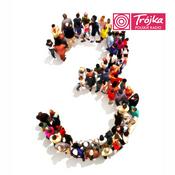996 odcinków

Plum pudding and sea swimming: Irish traditions that have stuck and new ones that have taken off
24.12.2025 | 27 min.
It’s Christmas Eve and so much about this time of year is about the things we do and eat – not because we particularly want to do them or even enjoy eating them – but it’s traditional.So what are the traditions we’ve clung to and what are the new ones that have crept up on us?Who sends Christmas cards anymore? And why have Poinsettias, once such an exotic seasonal plant, fallen out of favour?Irish Times feature writer Laura Slattery has been teasing out the traditions that make an Irish Christmas.Presented by Bernice Harrison. Produced by Declan Conlon. Hosted on Acast. See acast.com/privacy for more information.

From Traitors to Kneecap: What kept us entertained in 2025
23.12.2025 | 25 min.
At a time when there are media think pieces galore about how atomised entertainment is, how people don’t talk about TV like they used to; how the music industry is fractured beyond repair; and how young people are too stuck to their screens to engage in real-life politics, 2025 proved all that wrong.RTÉ’s smash hit reality TV show Traitors Ireland was a ratings juggernaut that dished up endless water-cooler moments. Oasis played two triumphant Croke Park gigs, with all talk about eye-watering ticket prices forgotten in the blazing sunshine and general euphoria. And Kneecap’s frontman Liam Óg hAnnaidh aka Mo Chara’s London court appearances became mini-festivals with music mixing with politics.And then where was Lily Allen’s tell-all album, West End Girl and presidential hopeful Maria Steen and her handbag.These and other much-talked about highlights are picked over by Aideen Finnegan from the Irish Times podcast team and journalist Niamh Browne.Presented by Bernice Harrison. Produced by Suzanne Brennan. Hosted on Acast. See acast.com/privacy for more information.

Inside Tommy Robinson’s world: Unholy mix of faith and fury on the streets of London
22.12.2025 | 26 min.
British far-right activist Tommy Robinson is the UK’s most notorious anti-Muslim activist.At 43, he is the street leader of the radical right-wing nationalist upsurge gripping Britain.An estimated 150,000 like-minded protesters turned out in London in September for his “Unite the Kingdom” march and for months Irish Times London correspondent Mark Paul has tried to get an interview with him.And then the call came out of the blue on a cold December evening.Robinson was planning a stunt in an hour’s time – to announce the date of his next protest – and would the Irish Times like to come?In the end the stunt failed for technical reasons but Paul got to see how the avowed right-wing radical works and got to shadow him the following day.At a choral service – to “bring the Christ back into Christmas” he got to see how Robinson is mixing his newfound conversion to evangelical Christianity with his anti-immigrant message.Paul tells In the News how Robinson’s new style of campaigning echoes the Maga movement that got Donald Trump elected.Presented by Bernice Harrison. Produced by Declan Conlon and Suzanne Brennan. Hosted on Acast. See acast.com/privacy for more information.

2025 was a year of upheaval. But what will it be remembered for?
19.12.2025 | 33 min.
2025 was a year of global upheaval, from the activities of the Trump Administration to instability in the Middle East and the reshaping of power politics as China continues its rise. But what will it be remembered for in the long run? Irish Times foreign correspondents Denis Staunton, who is based in Beijing, and Europe correspondent Naomi O’Leary, each picked two events whose impact will be felt into the future. They include the meeting between Narendra Modi, Vladimir Putin and Xi Jinping, a trilateral power meeting in China that said much about the relationship between the US and the rest of the world; the October 10th ceasefire in Gaza, which is broadly holding in a way other ceasefires haven’t; the record S&P stock surge in the US and why it loudly hints at an AI bubble and what that could mean for Ireland; and Europe’s growing willingness to break a taboo, to reconsider the terms of the UN 1951 Refugee Convention which gave immigrants and refugees rights and imposed obligations on European countries.And amid all the gloom there were some lighter moments that struck our two correspondents.Presented by Bernice Harrison. Produced by Declan Conlon. Hosted on Acast. See acast.com/privacy for more information.

Why Ireland is under pressure in a battle over European trade
18.12.2025 | 20 min.
After 25 years the Mercosur deal is reaching crunch time. The trade deal which would permit free trade between the EU and the South American countries that make up the Mercosur bloc has a deadline of December 20th.It allows the EU to export more cars, wines and spirits to South America, with goods including meat coming the other way – and that’s what worries Iris, but also French, farmers.There are hopes it will be signed off at this week’s two-day EU summit in Brussels; hopes at least on the part of the European Commission and Germany.France and Italy are still holding out on signing up – urging a push-back to January on any decision – while Ireland appears stuck in the middle.Mercosur countries form the world’s sixth largest economy with a total population of 270 million people. It’s a vast market for EU producers.So how will the Mercosur talks play out this week and what pressure will Ireland be put under to sign up to a deal that Irish farmers say would greatly injure not just them, but the economy as a whole.Presented by Bernice Harrison. Produced by Declan Conlon. Hosted on Acast. See acast.com/privacy for more information.
Więcej Wiadomości podcastów
Trendy w podcaście Wiadomości
O In The News
Słuchaj In The News, Global News Podcast i wielu innych podcastów z całego świata dzięki aplikacji radio.pl

Uzyskaj bezpłatną aplikację radio.pl
- Stacje i podcasty do zakładek
- Strumieniuj przez Wi-Fi lub Bluetooth
- Obsługuje Carplay & Android Auto
- Jeszcze więcej funkcjonalności
Uzyskaj bezpłatną aplikację radio.pl
- Stacje i podcasty do zakładek
- Strumieniuj przez Wi-Fi lub Bluetooth
- Obsługuje Carplay & Android Auto
- Jeszcze więcej funkcjonalności


In The News
pobierz aplikację,
zacznij słuchać.




































